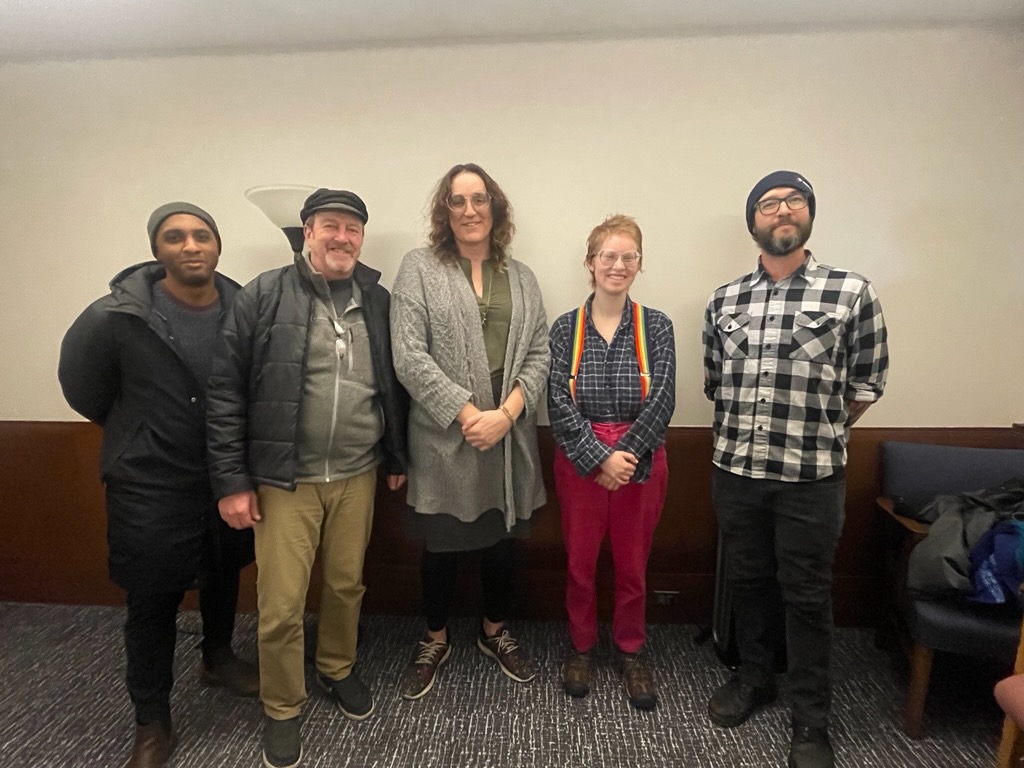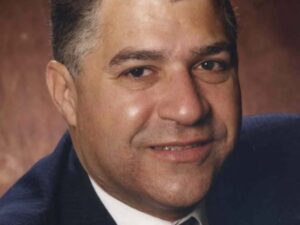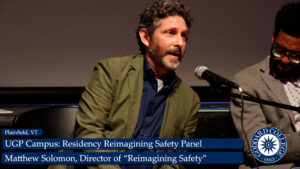
by Dustin Byerly (BA RUP ’01)
There are few images that capture and preserve the essence of an entire movement and moment in time better than the photographs of Tommie Smith, John Carlos and Peter Norman at the 1968 Summer Olympic Games in Mexico City. Tommie Smith had just won the gold medal for the United States in the 200-meter race, with a world record time of 19.83 seconds; Australia’s Peter Norman finished second; and Smith’s teammate, John Carlos, placed third.
As Smith and Carlos took their places on the podium, draped in their Olympic medals, they lowered their heads and raised their clenched fists covered in black leather gloves in a historic stand for human rights, liberation, and solidarity. This courageous act of resistance propelled Tommie Smith into the spotlight as a human rights spokesman, activist, and symbol of African American pride.
As a founding member of the Olympic Project for Human Rights, Smith had originally advocated for a boycott of the 1968 Games as a stance against Apartheid, racial segregation, and racism in American athletics. When the boycott failed to achieve support, Smith decided to make his own statement. “My mind had been made up that I was going to make a stand on one of the most prominent podiums in the world,” he said. “But I had to get on the podium in order to do so. That was the motivation that drove me to train hard and win.”

“It was my victory and I stood… for human rights and equality. I stood to draw attention to the fact that we black athletes had been asked to represent a country that didn’t treat us as equals.” Misunderstood as a “black power” salute at the time, the gesture brought great hardship to both athletes. Smith received death threats to himself and his family and was permanently banned from the Olympics, never to race again. And although he is the only person in the history of track and field to hold eleven world records simultaneously, he has yet to be inducted into the U.S. Olympic Hall of Fame.
Following the games of the 19th Olympiad, Smith played professional football under the legendary Paul Brown with the Cincinnati Bengals for three years. He went on to become an Assistant Professor of Physical Education at Oberlin College in Northeast Ohio, where he taught sports sociology, coached track and field, football, and basketball, and served as Assistant Athletic Director to Jack Scott.
It was Scott who encouraged Smith to pursue his graduate degree and suggested that he look at Goddard College, which at that time had a program in Cambridge, Massachusetts. “Jack told me that he thought it was necessary for a person with my ideas and my ideals to go further,” said Smith. “I couldn’t go in ‘Mainstream America’ and get the degree I thought was necessary and push my ideas forward because I would be taught something. No, I wanted to teach them.”
Smith enrolled and was accepted into the Goddard Cambridge Graduate Program for Social Change in 1971. He graduated with his Master’s in 1974. The program, created in 1970, was a collaboration between Goddard and the Cambridge Policy Studies Institute that provided training and certification for those interested in combining the theory and practice of social change.
“My time at Goddard was an unforgettable educational odyssey,” said Smith, “I was able to bring all of my previous academic and life experience together, and develop my understanding of the impact of racism on all aspects of the human experience.”
The program was phased out in 1979 as a result of declining enrollment; however, the strong social emphasis of the program and its insistence on testing theory through practical work remains an integral part of Goddard’s current model of education.
Throughout his entire life, Smith has used the platform he gained from his notoriety to advocate for racial justice and the lives of countless youth and young adults. He spent decades as an educator and coach, and continues in his retirement to be an advocate, speaker, and trainer. The Tommie Smith Youth Initiative, established in 2004, calls attention to the urgent need to prevent childhood obesity by providing developmentally appropriate physical activity and nutrition education for at-risk children.
Smith has received numerous awards and is recognized for his work both on and off the field. He was inducted into the National Track & Field Hall of Fame (1978), the California Black Sports Hall of Fame (1996), and the Texas Black Sports Hall of Fame (2012), to name a few. He also received an Honorary Doctorate from San Jose State (2005), the Trumpet Award (2007), the Peace Abby Courage of Conscience Award (2008), and the Arthur Ashe Courage Award (2008).
His lifetime commitment to education, activism, and public service is what prompted Goddard College to offer him the 3rd Annual Presidential Award for Activism.

Smith received the award from former President Barbara Vacarr at the Bachelor of Arts commencement on October 6th, 2013. Speaking in the Haybarn Theatre to a full house of students, staff, faculty, family, and local community members, Vacarr described Smith’s iconic gesture in 1968 as a “cry for freedom in support of human rights.”
Tommie Smith’s presence at graduation was exhilarating and authentically Goddard. Smith captivated everyone in the Haybarn that day. He embraced and shook hands with every graduating student as he made his way through the human tunnel of graduates to his seat. As Smith took the podium to deliver his acceptance speech, the entire room stood up and erupted into thunderous applause and a row of students lined the upper level of the Haybarn with their heads bowed and fists raised in the air in recognition of Dr. Tommie Smith’s life and work. Smith raised his clenched fist in return.
Phyllis Brown, Program Director of the Undergraduate Program, was deeply moved by the event. Brown, who grew up in an all-white community, remembered Smith’s victory stand and the impact it had on her as young girl. “The day after, when my class was told to stand to do the pledge…I put my fist up in solidarity and to show that I was aware, that I was part of the struggle for Civil Rights.” Brown had been sent to the Principals office; her punishment: to copy the pledge of allegiance 100 times with her left hand (Brown is right-handed). “Tommie Smith’s stand on that podium holds personal and profound meaning for me,” said Brown. “It heavily influenced my life of activism, community service and fighting against racism and all forms of oppression.”
Reflecting on that historic moment in 1968, Smith said in his commencement speech,“The soul of a man was used as a beacon to shed optimum light on a sober situation and a struggle for lawful, communal parity…And the beat goes on.” Smith urged the graduating class to trust themselves and to take what they had learned at Goddard into their communities. “No bird soars too high if he soars with his own wings,” he said,quoting William Blake. “Never forget that,” he said.
Students were moved by Tommie’s speech. “The opportunity to share my graduation with the humble, yet powerful, words of Tommie Smith,” said Seneca Kristjonsdottir (IBA ’13) of Golden, Colo., “solidified in me further an inspiration to pursue genuine work.”
Smith, who had never attended a residency in Vermont, was blown away by his experience in Plainfield. “I was surprised at the size, the history of it, and the knowledge, respect and love the people showed. The most exciting thing about it was the academics: these were some of the smartest people I had ever met…I think it is because their souls are invested in their own truth.”
His advice for young activists: “You have to understand your program, whatever it is, will have to be a diversified program, and that it will require sacrifice, and that sacrifice is going to grow… Always consider how your work, or program, is going to help others.”
This article originally appeared in Clockworks Magazine in 2014.







